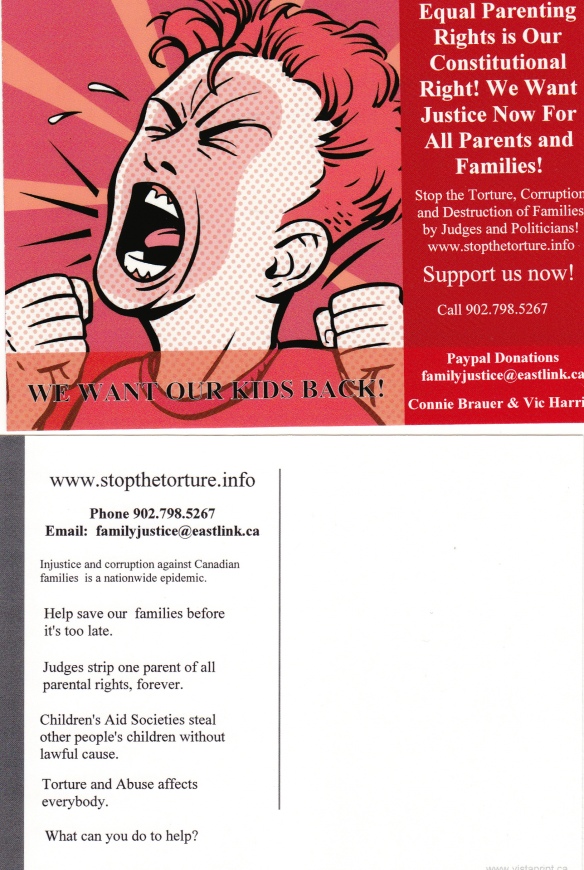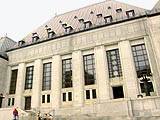Barbara Kay: Stephen Harper’s last chance to make life fairer for suffering fathers
Republish Reprint
Barbara Kay | May 26, 2014 | Last Updated: May 23 4:52 PM ET
More from Barbara Kay | @BarbaraRKay
Peter J. Thompson/National PostIn litigation, although lip service is paid by law associations to the “best interests” of the child, make no mistake: lawyers work to advance their clients’ wishes, not the children’s.
Tomorrow, May 27, will feature the conclusion of parliamentary debate on Conservative MP Maurice Vellacott’s private member’s Bill C-560, which proposes an amendment to Canada’s Divorce Act that would protect children’s right, in the absence of proven neglect or abuse, to love and be loved equally by both parents after separation.
Our now-superannuated paradigm — one primary, one secondary parent — is based on the flawed assumption that judges can somehow arrive at the “right” distribution of parenting time. Current social science overwhelmingly deems this an impossible task. Litigation necessarily triangulates the children into their parents’ divorce, encouraging drawn-out, financially crippling and emotionally devastating scenarios from which nobody but lawyers profit. It is an unethical and counterproductive model most Canadians firmly deplore.
All informed critics give our system a failing grade. No other alternative proposed over three decades has proven effective. Mediation has not reduced bitter custody litigation. Neither have collaborative lawyers, costs sanctions, parenting education or any other initiatives. Why? Because litigation remains the ace up the sleeve of the less collaborative parent. Sociological research tells us that what children want after separation is two parents, not one parent and a visitor. But once in litigation, although lip service is paid by law associations to the “best interests” of the child, make no mistake: Lawyers work to advance their clients’ wishes, not the children’s.
Related
- Edward Kruk: Equal shared parenting — best for parents, best for children
- Tasha Kheiriddin: ‘Equal shared parenting’ law doesn’t put kids first
If the bill were to make it to the Justice Committee of the House of Commons for further study and review, parents, social scientists and others who understand these issues far better than our elected representatives would have an opportunity to speak to the issue. But from a reliable government source, I am informed that cabinet ministers have been instructed to vote against Bill C-560, which will vitiate the substantial number of caucus votes in favour. This decision would be an unconscionable insult to Mr. Vellacott and a repudiation of the party’s erstwhile platform position. Add the mass NDP nays and the paucity of free-vote yays from Liberals, and a good and necessary reform will founder.
If I thought the bill were failing on its merits after a thorough public airing and debate, I could accept it with grace. But there has been no public debate, and I know from discussions with intelligent people — even those who claim to grasp the principles involved — that misconceptions about equal shared parenting as a default abound. One such friend said he disagreed with the bill because “I think mothers should have a larger role in parenting after separation.” He apparently thought the bill would force all parents to hew to the equal-time model. On the contrary: collaborative parents could make any arrangement they liked. The default would avoid litigation in high-conflict cases.
A document called “Myths and Facts” to correct such misconceptions was circulated to everyone in Parliament. It fully responds to every concern raised by the opposition. But it seems very few MPs have read it.
If mothers were the main victims of our failing system, would this bill not have passed by acclamation many years ago?
The fact that 30 cabinet ministers, many (most?) of whom are not really familiar with the parameters of the proposals, can shoot down this excellent, deeply researched and judicious principle — one approved of by 80% of Canadians — without an opportunity to inform themselves thoroughly on what it actually means, is cruelly arbitrary and unjustified by any reasonable criterion.
It is also personally embittering. I am familiar with hundreds of personal stories of literally ruined lives, tales of children anguished by forced separation from beloved parents because the “winner” took “all.” The “losers” are virtually all dads. Can we speak plainly here? If mothers were the main victims of our failing system, would this bill not have passed by acclamation many years ago? Why are politicians so afraid of ideologues? They don’t represent Canadian women, a majority of whom want to see gender fairness entrenched in family law.
Tomorrow will be the last chance for the Conservative government to do the right thing. I call upon the Prime Minister to allow his ministers a free vote in accordance with their individual conscience, and to send Bill C-560 to committee for the meaningful consideration it deserves.
National Post











